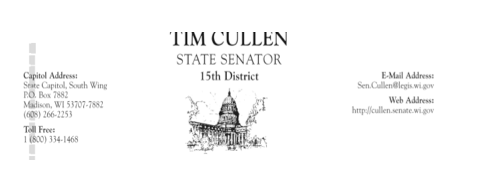Retrun to Nov. 27 Updates Home Events Site Map Archived Updates Politicians at Work

FOR IMMEDIATE RELEASE:
FOR MORE INFORMATION CONTACT:
Senator Tim Cullen, (608) 266-2253
October 31, 2012
CULLEN ANNOUNCES MINING COMMITTEE WORK
After the Election, Committee will Continue Moving Forward on Mining Regulatory Reform
(MADISON) – Senator Tim Cullen (D-Janesville), chairman of the Senate Select Committee on Mining, today announced the committee’s plans for November and December. Cullen said he hopes to have the committee complete the following actions so the Legislature will be ready to take up the issue of mining in January:
• Hold an informational hearing to allow the Wisconsin Mining Association to report on a study it commissioned and will publish in the coming weeks.
• Hear from local government and local economic development officials on how tax revenue collected from a mine should be distributed between local governments and the state.
• Hold a “markup session” of the entire mining committee in order to discuss in public the measures which the committee could support in a new mining bill.
• Hold a public hearing outside of Madison on a legislative document of some form – either a bill draft or a list of recommendations – developed by the committee.
Cullen noted that during three recent informational sessions, the mining committee learned some key facts from expert witnesses knowledgeable of the mine permitting process in Wisconsin:
• Issuing a mining permit in Wisconsin in one or two years is unrealistic, and statements to the contrary serve only as a political mirage intended to purposely mislead the people of Wisconsin who so desperately want more jobs.
• Assembly Bill 426, a mining proposal from last session, was a political document, not a realistic bill.
• AB-426 would have led to years of litigation for several reasons, but most clearly because it would have violated the Public Trust Doctrine, a clause in the state’s Constitution which guarantees the protection of Wisconsin’s waterways.
• Wisconsin does not have sole authority over the approval of a mining permit in the state. Federal regulatory agencies – primarily the U.S. Army Corps of Engineers – must also approve a mining permit.
• If Wisconsin passes a law that sets an unrealistically short permitting timeline, the Army Corps of Engineers will end collaboration with the state and continue on its own timeline, forcing a mining company to finance and navigate two separate, disjointed permitting processes.
• The Army Corps of Engineers would require approximately six years to grant a mining permit for a mid-sized or large mine.
• No matter the action by the Wisconsin Legislature to shorten permitting timelines, federal regulatory agencies will take the time they need to ensure enforcement of the federal Clean Water Act.
• Minnesota – often cited for its welcoming regulatory environment to the mining industry – is currently working with a mining company to permit a mine site called PolyMet. That permit process is now in its eighth year and there is no projection as to when it will be completed.
The mining committee heard from several experts that AB-426 would have hindered and delayed mining in Wisconsin, not helped it. The bill likely would have forced the U.S. Army Corps of Engineers to end collaboration with Wisconsin on the permitting process, leading to the need for two separate environmental reviews. This would have led to additional costs incurred by the mining company, as well as greater opportunities for third party groups to prolong the permitting process using legal maneuvers.
“I am optimistic that using the information we learned from recent informational hearings, the committee can develop a bipartisan bill that can pass the legislature because it will make mining more welcome in Wisconsin without harming our environment, especially our water,” Cullen said.
“I am 100 percent certain that Wisconsinites will not hear the truth about mining in Wisconsin until after the election, when misleading campaign ads critical of those opposed to AB-426 subside,” Cullen said. “Once the realities regarding the negative consequences of AB-426 are known, the people of Wisconsin can learn what changes to Wisconsin’s current mining laws are needed to help mining return to our state,” Cullen said.
“I want to develop a bill that passes the reasonableness test, and AB-426 failed that test,” Cullen said. “It will be more beneficial to Wisconsin if the Legislature passes a realistic bill, not a bill that, when understood, is not reasonable and would not be helpful to the mining industry or the environment.”
The Senate Select Committee on Mining consists of Sen. Tim Cullen (Chair), Sen. Bob Jauch (Vice Chair), Sen. Robert Cowles, Sen. Jon Erpenbach, Sen. Jim Holperin, Sen. Mary Lazich, Sen. John Lehman, and Sen. Dale Schultz.
###
